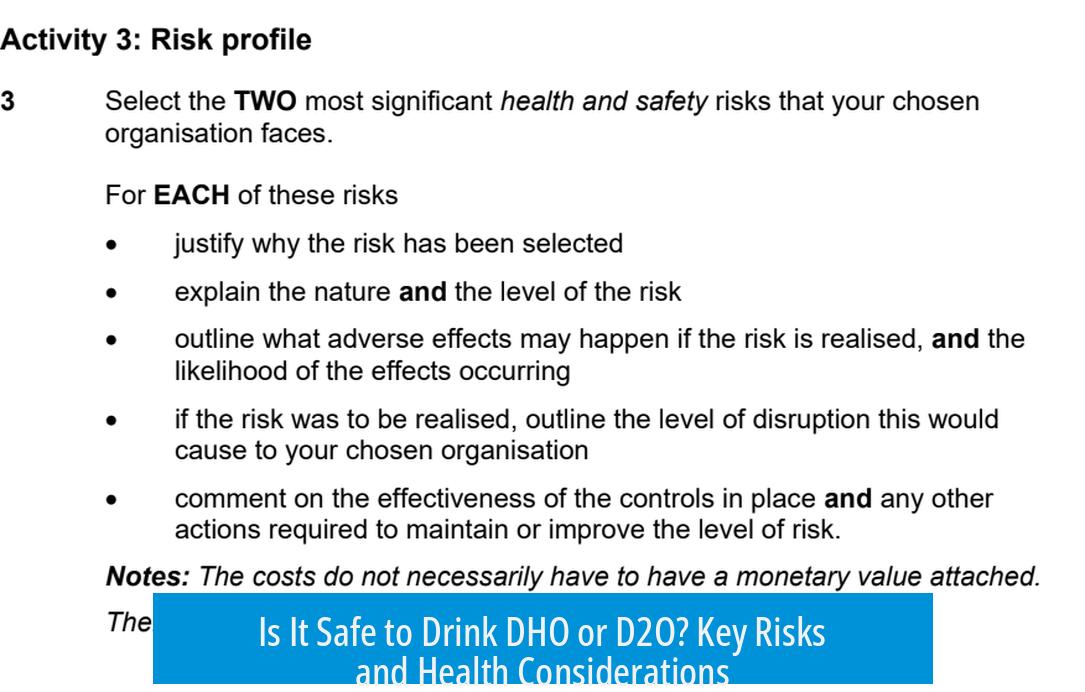Is it Safe to Drink DHO or D2O and If Not Why?

Drinking small amounts of D2O (deuterium oxide or heavy water) is generally safe, but consuming large quantities or prolonged exposure is potentially harmful due to biological effects on molecular structures.
Understanding D2O and Its Presence in Water
D2O resembles ordinary water (H2O) but contains deuterium, a hydrogen isotope with one neutron. It naturally occurs at very low levels in normal water. Thus, humans already ingest trace amounts without harm. Small quantities—like a cup or two—pose minimal risk and are used safely in scientific studies such as human metabolism tracking.
Safety of Small Amounts
- You can drink a small amount of D2O with no immediate effects.
- Experimental volunteers have consumed about 100 mL without severe consequences.
- Mild side effects such as dizziness may occur due to changes in fluid density affecting balance systems in the inner ear.
- Double-labeled water studies commonly use about 5% D2O, indicating low health risks at these concentrations.
Toxicity Threshold and Health Risks

Problems arise when D2O replaces more than roughly 20% of total body water. At such levels, biological systems begin to malfunction:
| Body Water Replacement by D2O | Effect |
|---|---|
| Less than 20% | Generally safe; mild or no symptoms |
| Around 20–70% | Onset of toxic effects such as weight loss and decreased health (observed in animal studies) |
| Near 100% | Severe biological disruption, fatal outcomes reported in animals |
Animal experiments confirm that replacing most body water with D2O leads to health decline. For example, mice experienced weight loss after a week on 70% D2O. Historical experiments reported fatal results in dogs supplied only with heavy water.
Biological Mechanism Behind Toxicity
Toxic effects relate mainly to deuterium’s impact on hydrogen bonds. These bonds stabilize proteins, nucleic acids, and other biomolecules essential to life. Deuterium forms weaker hydrogen bonds compared to protium (normal hydrogen), due to its heavier mass and altered quantum tunneling effects.
When D2O concentration rises:
- Deuterium substitutes exchangeable protons in biomolecules.
- Hydrogen bond strength decreases, destabilizing protein and nucleic acid structures.
- Structural instability increases denaturation likelihood.
This disruption threatens cellular function and overall health. Such effects accumulate with higher D2O levels and longer exposure times.
Uncertainties and Metabolic Considerations
Precise lethal doses for humans are not well defined due to ethical and practical limitations. Symptoms beyond dizziness are poorly documented, though metabolic differences caused by deuterium substitution could trigger unknown complications. Short-term minimal complications are likely, but risks grow with dose and duration.
Practical Recommendations
- Occasional intake of small amounts of heavy water is generally not harmful.
- Do not consume large volumes or use D2O as a primary drinking water source.
- Be wary of extended use; long-term effects include deterioration of health and potential toxicity.
- Avoid replacing a significant portion of body water with D2O to prevent biomolecular damage.
Summary of Key Points
- Small amounts of D2O are safe and naturally present in water.
- Toxicity likely occurs if over 20% of body water consists of D2O.
- Deuterium weakens hydrogen bonds in biomolecules, causing structural instability.
- Mild side effects can include dizziness; serious effects arise only at high concentrations.
- Animal studies show health decline and death at elevated D2O levels.
- Metabolic effects may be minimal but remain uncertain at high doses.
- Limit D2O intake to brief, small doses and avoid long-term consumption.





Leave a Comment